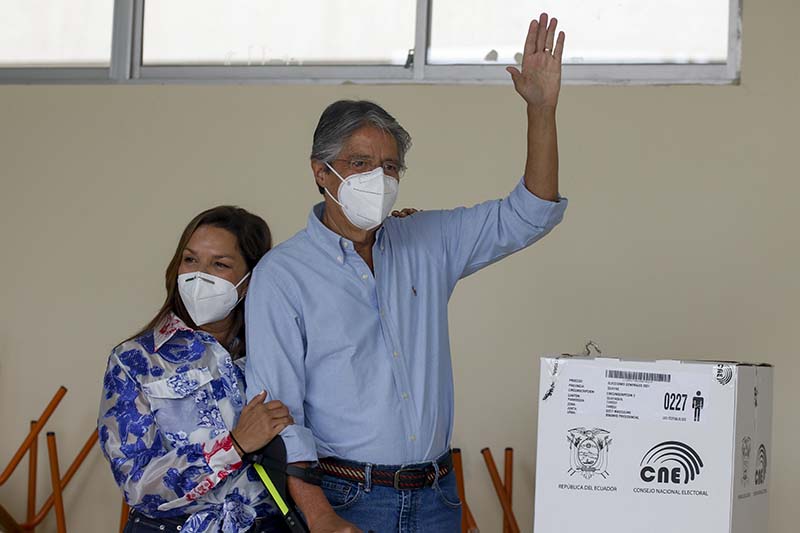

Voters in Ecuador appeared to turn to a conservative businessman in Sunday’s presidential runoff election, rebuffing a leftist movement that has held the presidency for over a decade marked by an economic boom and then a yearslong recession, while in neighbouring Peru a crowded field of 18 candidates was virtually certain to result in a second round of presidential voting in June.
Voters in Ecuador and Peru cast ballots under strict public health measures because of the coronavirus pandemic, which has recently strengthened in both countries, prompting the return of lockdowns and heightening concerns over their already battered economies. Peruvians also were electing a new Congress.
The Electoral Council in Ecuador had not declared an official winner in the contest to replace President Lenín Moreno next month, but results released by the agency showed former banker Guillermo Lasso with about 53% of votes and leftist Andrés Arauz at 47%, with just over 90% of votes counted. Arauz had led the first round of voting with more than 30% on Feb. 7, while Lasso edged into the final by finishing about a half a percentage point ahead of environmentalist and Indigenous candidate Yaku Pérez.
Arauz was backed by former President Rafael Correa, a major force in the South American country despite a corruption conviction that sent him fleeing to Belgium beyond the reach of Ecuadoran prosecutors. Moreno was also an ally of Correa but turned against him while in office.
“Correa’s negatives outweighed the expectation of a new, unknown candidate who had no career and who did not campaign very well,” said Grace M. Jaramillo, an adjunct professor at the University of British Columbia whose research includes Latin America. “He did not speak for all audiences … for the entire population, and he could not respond to human rights accusations of the Correista era.”
Correa governed from 2007 to 2017 as an ally of Cuba’s Fidel Castro and Venezuela’s Hugo Chavez. He oversaw a period of economic growth driven by an oil boom and loans from China that allowed him to expand social programs, build roads and schools and pursue other projects.
But Correa increasingly cracked down on opponents, the press and businesses during his latter stage in office and feuded with Indigenous groups over development projects. Ecuador also hit an economic slowdown in 2015, largely driven by the drop in oil prices
Lasso finished second in the previous two presidential contests. He favors free-market policies and Ecuador’s rapprochement with international organizations. He has proposed raising the minimum wage to $500, finding ways to include more youth and women in the labor market and eliminating tariffs for agricultural equipment.
“We all wish for an Ecuador of opportunities, free and democratic, where all families can become prosperous,” Lasso said after voting.
Elections officials did not plan to officially declare a winner Sunday, but at least one head of state congratulated Lasso on the election’s outcome. Uruguayan President Luis Lacalle Pou tweeted that he had spoken with Lasso “to congratulate him on his success and to get to work together on the issues that our countries have in common.”
Ecuador is deep in a recession that many fear will worsen as lockdowns return because of a spike in COVID-19 cases. Ecuador has tallied more than 344,000 cases and over 17,200 deaths as of Sunday, according to data from Johns Hopkins University in the United States.
The new president’s main task will be “to depolarize the country,” Jaramillo said. “There will be no signs of governance if the new government does not reach out and generate a platform where agreements with the (National) Assembly are possible.”
Peru’s election turned into a popularity contest in which one candidate even addressed how he suppresses his sexual desires. The crowded field of presidential hopefuls came months after the country’s political chaos reached a new level in November, when three men were president in a single week after one was impeached by Congress over corruption allegations and protests forced his successor to resign in favor of the third.
All former Peruvian presidents who governed since 1985 have been ensnared in corruption allegation, some imprisoned or arrested in their mansions. One died by suicide before police could arrest him.
Claudia Navas, a political, social and security risk analyst with the global firm Control Risks, said the fragmented election was the result of a political system that has 11 parties lacking ideological cohesiveness. She said Peruvians overall do not trust politicians, with corruption being a key driver of the disillusionment toward the political system.
Navas said the congressional elections would likely result in a splintered legislature, with no party holding a clear majority and political alliances remaining short lived. She said the new Congress also was likely to continue to exercise its impeachment authority to reinforce its own influence and block any initiative that threatens its own power.
“So, we’ll likely continue to see significant legislative populism. This implies moves that seek to satisfy the public short-term needs and demands to the detriment of medium- and long-term sustainability,” Navas said. “Regardless of who wins, we believe that the president is somewhat unlikely to complete his or her term in office because of the populist-type of stance of the Congress and the risk of political instability is likely to persist through the administration.
To avoid a June runoff, a candidate would need more than 50% of the votes, and recent polls pointed to the leading candidate garnering only about 15% support. The polls had centrist Yonhy Lescano as the frontrunner, followed by centre-right George Forsyth, conservative Rafael López Aliaga and Keiko Fujimori, the opposition leader and daughter of the polarizing former President Alberto Fujimori.
The country is among the hardest hit by COVID-19, with more than 1.6 million cases and over 54,600 deaths as of Sunday.